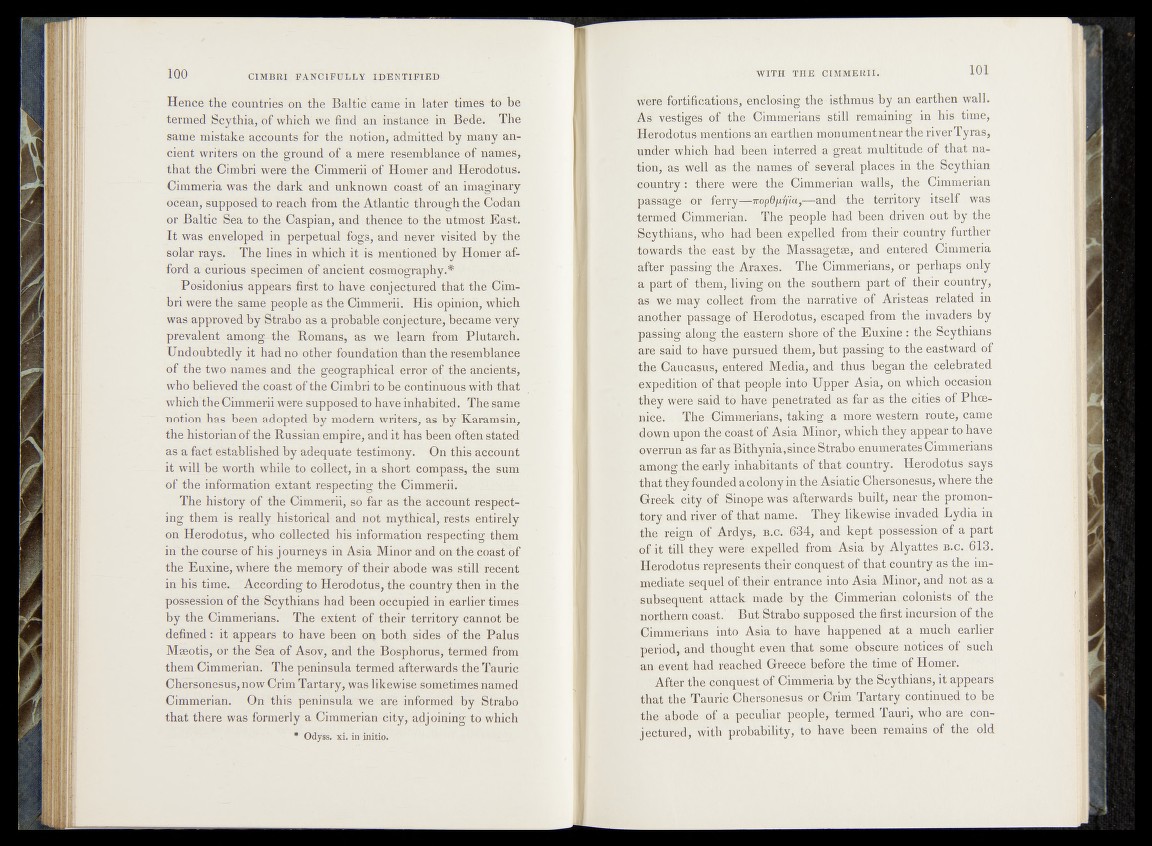
Hence the countries on the Baltic came in later times -to be
termed .Scythia, of which we find an instance in Bede. The
same mistake accounts for the notion, admitted by many ancient
writers on the ground of a mere resemblance of names,
that the Cimbri were the Cimmerii of Homer and Herodotus.
Cimmeria was the dark and unknowni coast of an imaginary
ocean, supposed to reach from the Atlantic through the Codan
or Baltic Sea to the Caspian, and thence to the utmost.3®ash
It was enveloped in perpetual fogs, and never visited by the
solar rays. The lines in which it is mentioned'by Homer afford
a curious specimen of ancient cosmography.*
Posidonius appears first to have conjectured that the Gim-
bri were the same people'as the Cimmerii. His opinion, which
was approved by Strabo as a probable conjecture, became very
prevalent among-the Romans, as we learn from Plutarch.
Und oubtedly it had no other foundation than the resemblance
of the two names and the geographical error of the ancients,
who believed the coast of the Cimbri to be continuous with that
which the Cimmerii were supposed to have inhabited, The same
notion has been adopted by modern writers, as by KaramSih,
the historian of the Russian empire, and it has been often stated
as a fact established by adequate testimony. On this aecbun t
it will be worth while to collect, in a short compass, the sum
of the information extant respecting the Cimmerii.
The history of the Cimmerii, so far as the account respecting
them is really, historical and not mythical, rests entitfeliy
on Herpdotus, who collected his information respecting them
in the course of his journeys in Asia Minor and on the coast of
the Euxine, where the memory of their abode was still recent
in his time. According to Herodotus, the country then in the
possession of the Scythians had been occupied in earlieritimes
by the Cimmerians. The extent of their territory cannot be
defined: it appears to have been oij both sides of the Palus
Maeotis, or the Sea of Asov, and the Bosphorus, termed from
them Cimmerian. The peninsula termed afterwards the Tauric
Chersonesus,now Crim Tartary, was likewise sometimes named
Cimmerian. On this peninsula we are informed by Strabo
that there was formerly a Cimmerian city, adjoining to which
• Odyss. xi. in initio.
were fortifications, .enclosing the • isthmus by an earthen wall.
Asi vestiges of the,;Cimmerians still remaining in his time,
Herodotus, mentions an eartjlieh monument near the river Tyras,
rpider which had been .interred .a jgreat multitude of that nation,
as vwelj as the names of *sevdral> placesrih' the Scythian
country': there, were^the Cimmerian walls, the Cimmerian
passage or f e r ^ y - T j - j—and sthe - territory itself was
termed, Cimmerian.' i^Bho^people had bé^%driven out by the
.Scy thians*, who „bad.been expelled from tB^ploiintry further
towardséthjg^ea^t hs^|dhe‘■ MassUget^ef^ and• *e$|t6|Ééd .Cimmeria
after ^^iilgwfh|e Araxes.- The Cimmerians|!p*;perhaps' óply
a p a rt -of t,kem,di vin'g! on the. sqbtlgeru' part óf theinlljOuntry,
asswè jniby coltëpt| ff 4m*-the InawUti ve of Aristeas related in
another p a ssag eH e ro d o tu sp e sbU ^d l from the invaders by
^passipg{^dojngft^%^cafet^rl?,'sh)ore of t©e;Eüxine : the5 Scythians
j&esaid*^ have pursued theipp’hufcpassing todhb eastwardof
the Caucasus, entered-Media/and^thus/beg^m* the celebrated
expedition} qf-that„pedple instoiUpper’ Asiay;ón whichtpeé^qn
they were sai®|pJiha-verp'èiÉëtEated akj for. as’ theteitiesidf Phoe-
jnic,e. Thp „iCimmpièns, taking a motejwèstern rpu<te> uainp
fdjpwn upon the'coalt'bf Asia MinOr^twhich they/appear to-havq
overrun as far as Bithynia,sinc§:S«trabo enumerateCimmerians
.amongf heeariy inhabitants of that^countryi iHerddptus' says
thatihey fomnded a?^ony in the. Asiatic Cheitéo^esusj-whe^e the
,/Greek city; óf' Sinopeiwa's'afterwards'built,mbaiithe promon-
p k^Vtand riverpf that name. T h ^ likewise invaded Lydia,iri
^the rp ig n ^ ll Ardy.sy giod!§3!4, and . k ^ l i ^ ^ ^ ^ ^ p f hipart
jofiitjtill they were? expelled-from Asia by. A^yatJe^^p^oiL3.
Herpdo>us represents their conques^fethat.country asfhe -im-s
fcpiediate, ,sequel .oLtheir entrance into Asia .Mindf^and mat.assa
subsequent attack made: by the Cimmerk'n^c^iiiiëtéi^i th |l
northern coast.'' But Strabo sUpposeddhefirst incursion of the
Cimmerians into Asia1' to have ha^pénpó at (earlier
period.,; and thought e^eipthat some o ^ q ttte s^ b ti^ e s^ ^ u e h
an event had reached Grëö§e0)eföre the time of Homer.
After the conquest of Cimmeria by the Scythians, dappears
that the Tauric Chepsqnesus,3^ | ^ ’jm Tartary continued, to ^ è
t h e ab©dè of a peculiar people,! termed^Tauri, w h o p re i/dQ n -*
jectured, with probability, «Ö have ttèëfc remains of the old